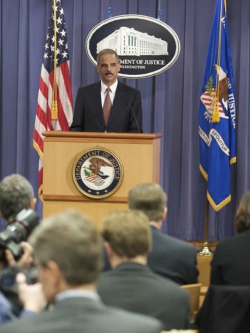Feb
11
2014

Written by Caitlin Endyke
Last summer, we released our report At the Crossroads: The Future of the LGBT Movement the same week that the Supreme Court struck down DOMA and Proposition 8. While we celebrated these momentous victories for the LGBT Movement, we also reminded folks of the long road ahead before LGBT Americans gain full equality.
This week, Attorney General Eric Holder Jr. moved our nation another step forward on the long road to equality by releasing a policy memo that pledged that his department would “eliminate the distinction between same-sex and opposite-sex married couples in the federal justice system” and “treat all individuals equally regardless of sexual orientation.” Holder’s memo provides numerous crucial protections for married couples, eliminating many levels of federal discrimination. However, the memo is also a reminder of how much more is needed to ensure full lived equality of all people regardless of sexual orientation or gender identity.
In our interviews with LGBT movement leaders and activists, respondents overwhelmingly said that the movement needed to continue the progress on marriage equality, and also look beyond that single issue to address other forms of discrimination – like in housing and employment. In his State of the Union address, Obama pledged to raise the minimum wage for federal contract workers to $10.10 per hour, but he failed to commit to barring federal contracts from refusing to hire workers on the basis of sexual orientation, as this piece in the New York Times notes. Even though many Americans mistakenly think that workplace discrimination against LGBT people is already illegal, they are wrong. An estimated 38% of the US population lives in states where same-sex marriage has been legalized, yet only 17 states have laws on the books that ban discrimination in all employment on the basis of sexual orientation. To address that problem, there are many campaigns to pass employment nondiscrimination bills across the country. But since we know that discrimination still happens against women and people of color – even though laws against it have been on the books for decades – local and state “ENDAs” are really a first step in protecting LGBT people against discrimination. That’s why more and more LGBT organizations are expanding their vision and strategy to form cross-issue alliances with other groups to help ensure true equality, for all Americans.
